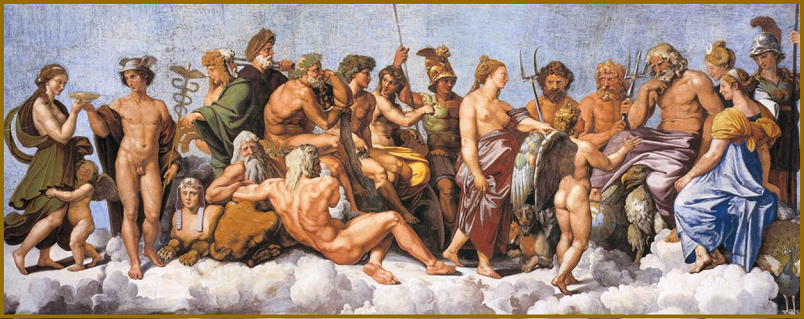Roman religion
Home | Latíné | Deutsch | Español | Français | Italiano | Magyar | Português | Română | Русский | English
⚜⚜⚜ Site Index - Key Pages ⚜⚜⚜
The cultus deorum Romanorum ('cults of the Roman gods') is a collective term for the various cults and rituals which constituted the religious life of Rome until the edict of Theodosius in 390 C.E. barred public cult.
Contents |
Variety
It is difficult to talk about Roman religion as a whole, since it is really composed of a large number of separate cults. In this sense there are many Roman religions. A number of specific terms are in use that let us focus on specific aspects of this large whole. Most inclusively, "Roman religion" could mean any religious belief or practice that was held or performed by any person who ever held Roman citizenship. In addition to the traditional sacra publica (state cults) and sacra privata (private cults), this includes such "foreign cults" as Judaism, early Christianity, various Egyptian cults and much more. Also included would be mystery cults that catered to the individual and the many fraternal collegia.[1]
"Numa Tradition"
Romans themselves identified certain aspects of their religion, the so-called "Numa tradition", as embodying important attitudes and practices which they sometimes turned to in times of stress. Cicero[2] wrote, "I am quite certain that Romulus by instituting auspices, and Numa ritual, laid the foundations of our state, which would never have been able to be so great had not the immortal gods been placated to the utmost extent."whose translation?
Sacra Publica
Influenced by their Etruscan, Greek and Phonecian neighbors, the Romans developed a complex state religion that emphasised the patron - client relationship between the gods and Romans: the pax deorum (religio) and maintained it by scrupulous observance of rituals. [3] This is the "sacra publica" and it was concerned with the state as a whole, not with regulating the specific beliefs or practices of individual citizens.
Sacra Privata
The term "sacra privata" refers to the relationships, practices and traditions with the gods of individuals and families.
Foreign Cults
Mystery Cults
Collegia
Roles
There were many diverse roles in the Roman tradition. Religious specialists such as sacerdotes, flamines, pontifices and augures advised magistrates on point of ritual and law.[1] The paterfamilias in his home and the magistrates in public normally performed religious rituals.
Beliefs and attitudes
Romans believed the gods were benevolent and respected the social code of the city. They abhorred superstitio which was a belief that the gods were vengeful, jealous and the attendant excessive and slavish behavior to placate them.[3] Varro said, "The religious man reveres the Gods as he would his parents, for they are good, more apt to spare than to punish" and "The Gods do not want sacrifice, their statues even less."citation needed
A perfunctory performance of a ritual, without any feeling, was simply not acceptable. Even Cicero, known for his cynical attitudes toward religion, speaks to the requirement of mental attitude in approaching the Gods, and that material gifts are less important [4] .
Cicero also cites the stoic philosopher Q. Lucilius Balbus' opinion about the cultus deorum: "Quos deos et venerari et colere debemus, cultus autem deorum est optumus idemque castissimus atque sanctissimus plenissimusque pietatis, ut eos semper pura integra incorrupta et mente et voce veneremur. Non enim philosophi solum verum etiam maiores nostri superstitionem a religione separaverunt." [2] (II, 71) ("We must revere and worship the gods, and the best "cultus doerum" is the most sacred, the most holy and the most full of dutifulness, in order to adorn them always with pure, whole and uncorrupted mind and word. Not only the philosophers but also our ancestors divided the superstitio from the religio.")
Roman religion was embedded in Rome's culture[1] .Because of this it is difficult to make a clear distinction between culture and religion.
References
- ↑ 1.1 1.2 1.3 Rupke, Jörg "Religion of the Romans"(ISBN 0745630154)
- ↑ 2.1 2.2 Cicero "On the Nature of the Gods"
- ↑ 3.1 3.2 Scheid, J., (2003) An Introduction to Roman Religion. (J. Lloyd trans.) Indiana University Press: Bloomington & Indianapolis. ISBN 0253216605
- ↑ Cicero: De Legibus 2.8.19; 2.10.24
As practised in Nova Roma
For details on how religio is practised in Nova Roma, see Category:Religio Romana (Nova Roma).
The Roman Pantheon
For more specific information on the Roman Pantheon, see List of Roman Deities
Related products
Products related to this topic are sold by: Sacred Source.
Master Index > English > Ancient Rome > Roman religion
Master Index > Maintenance Categories
Master Index > Maintenance Categories > Pages to be deleted > Articles with commercial links
Master Index > Maintenance Categories > Pages with content needing verification
